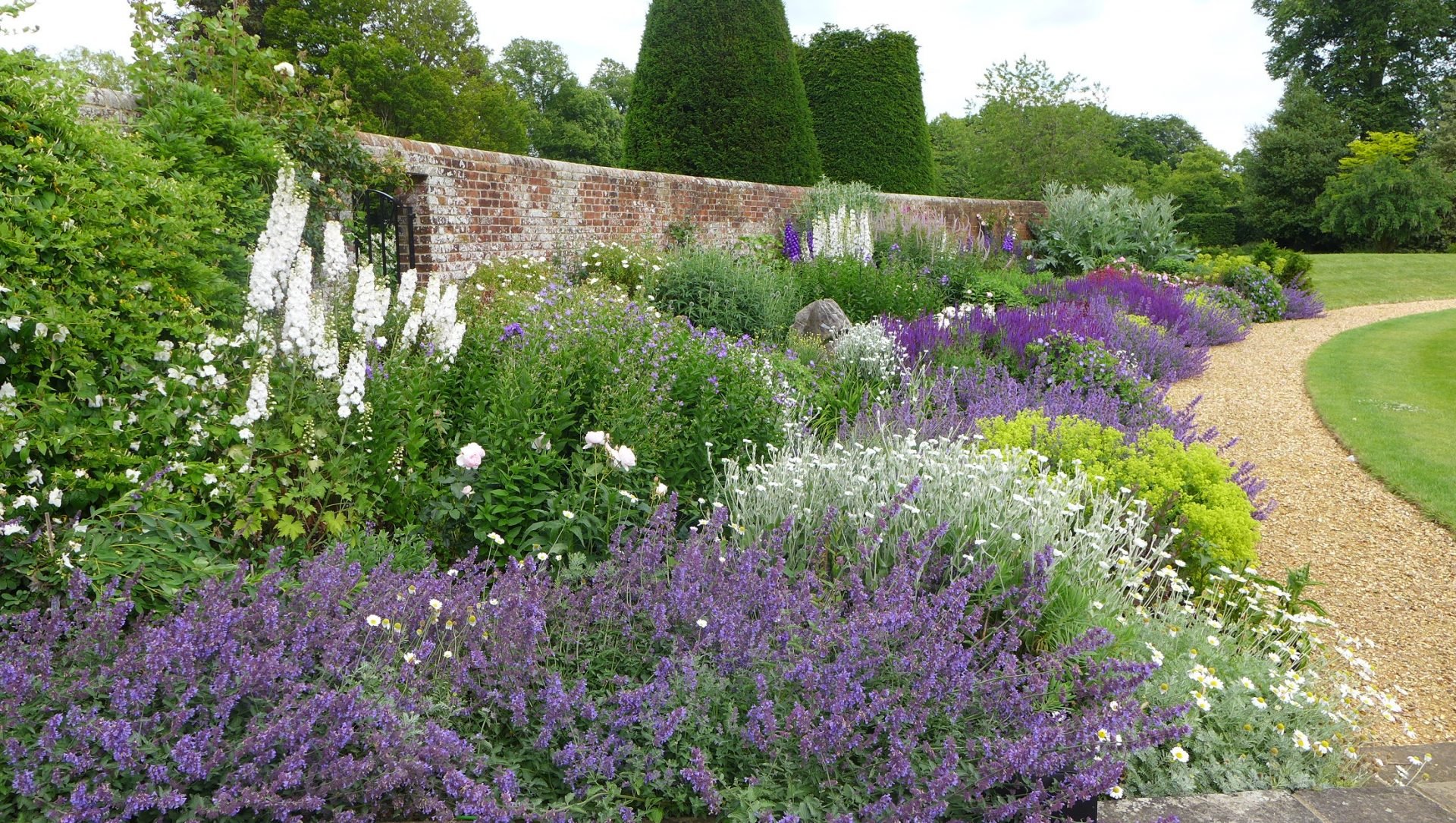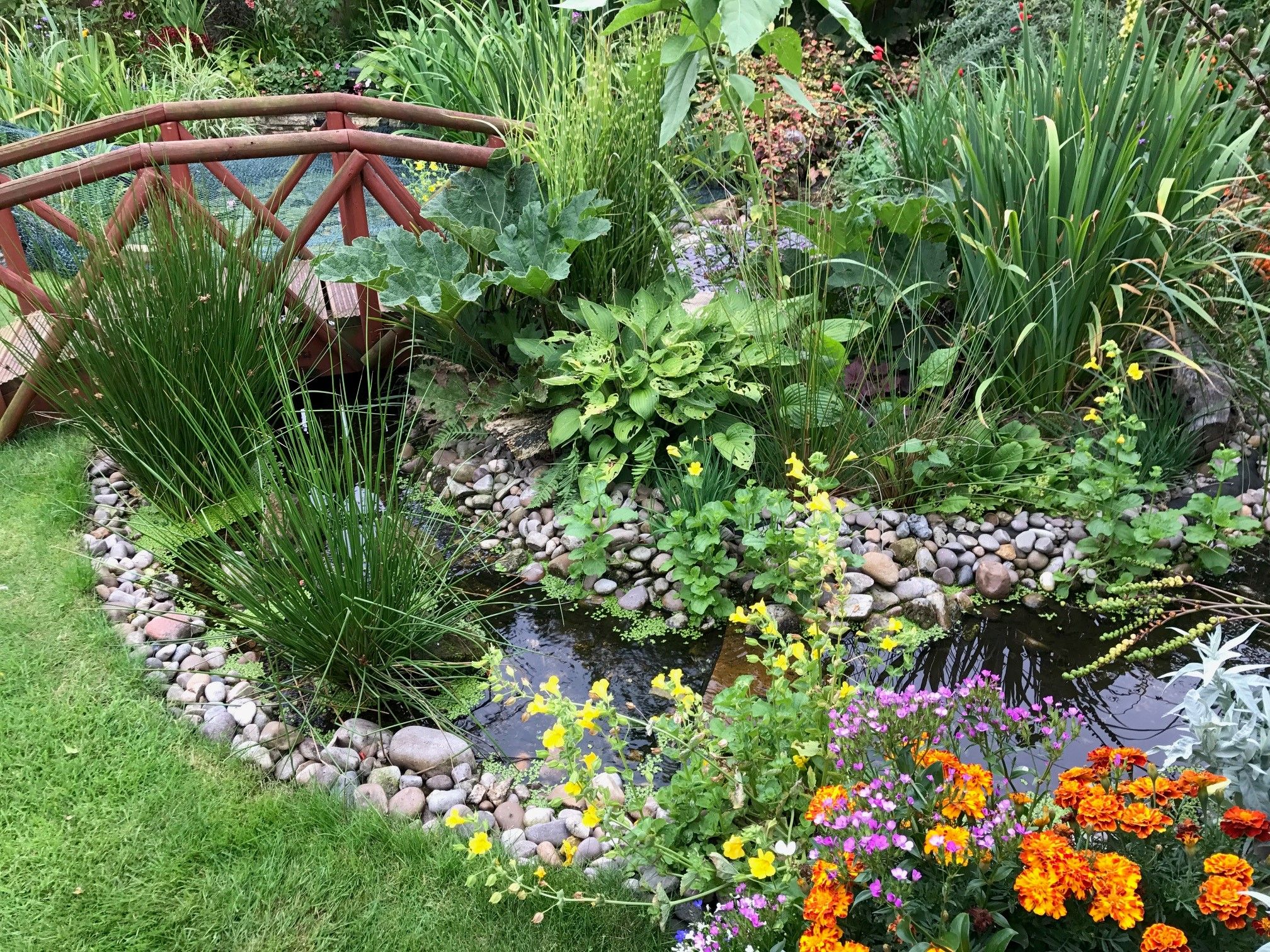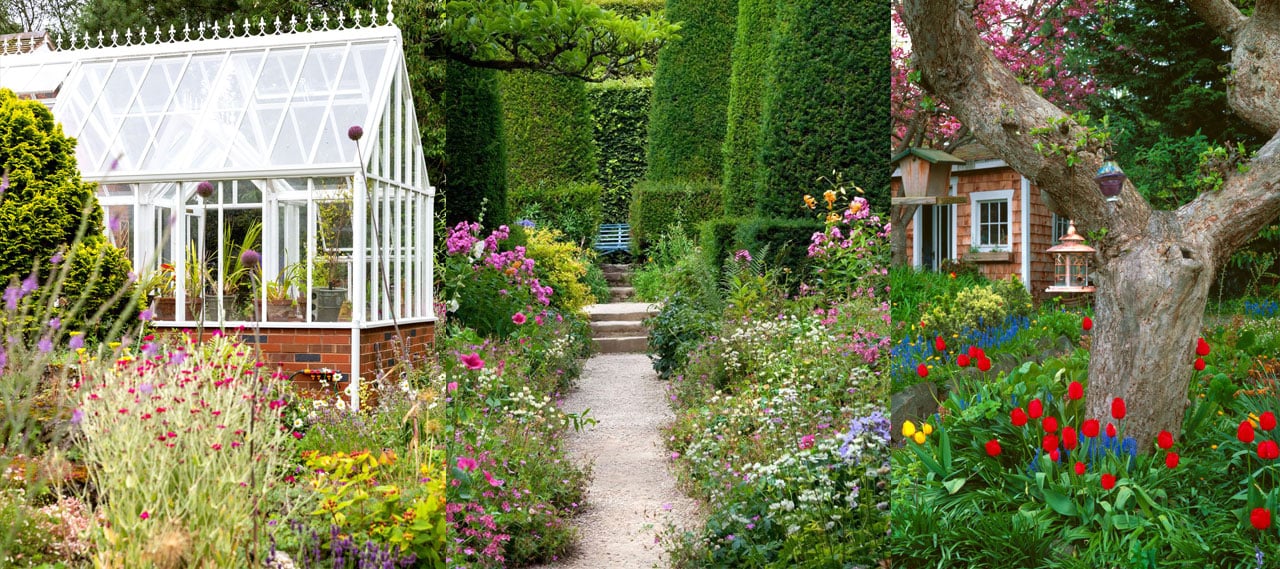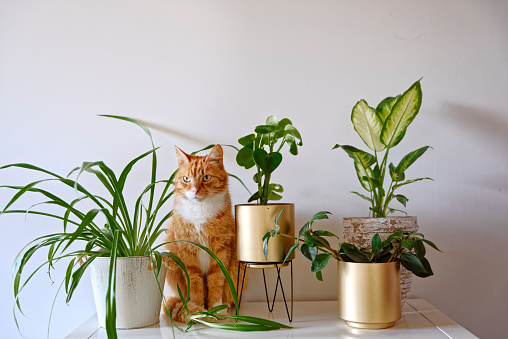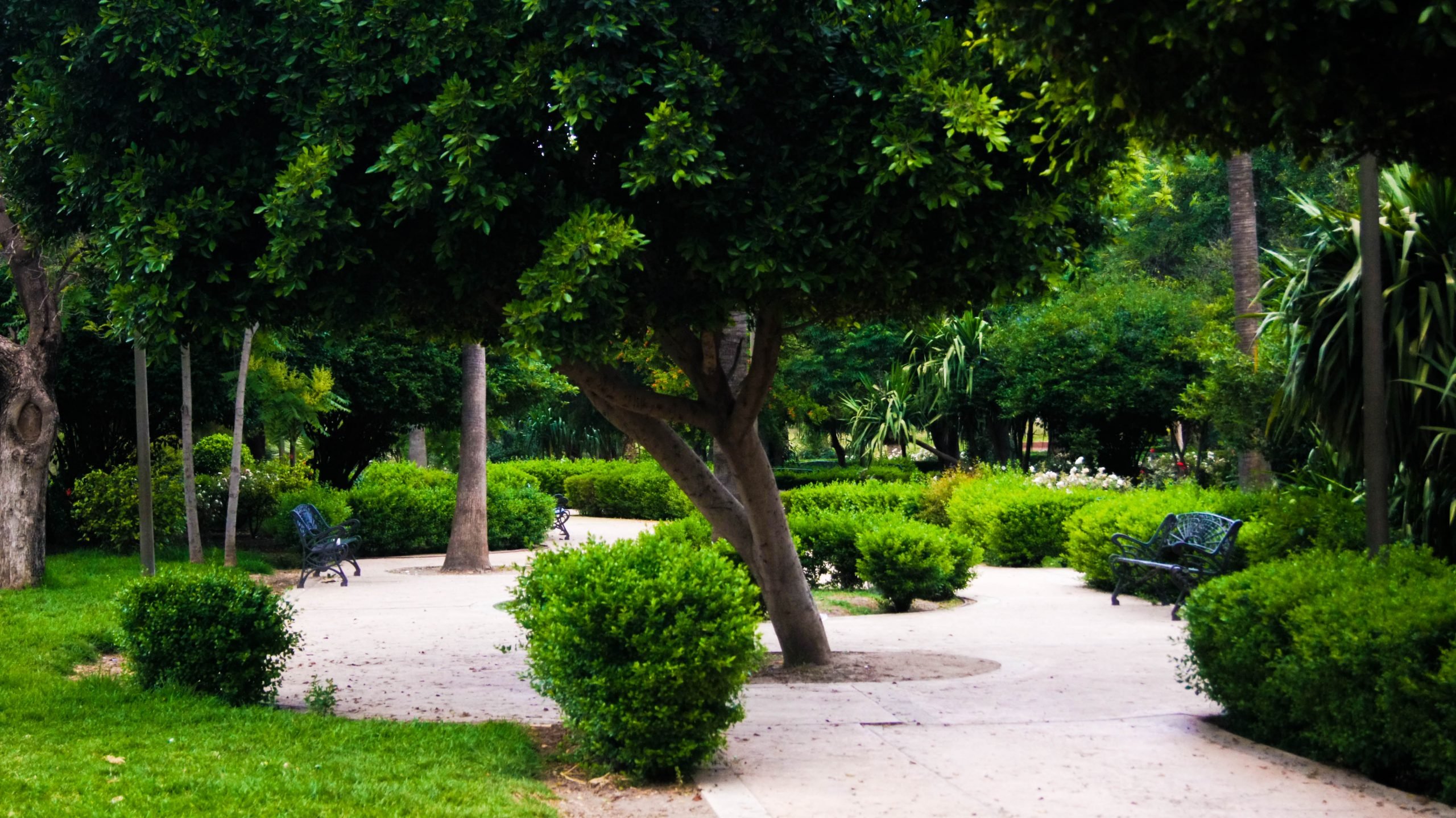15 Herb Garden Ideas You Can Try
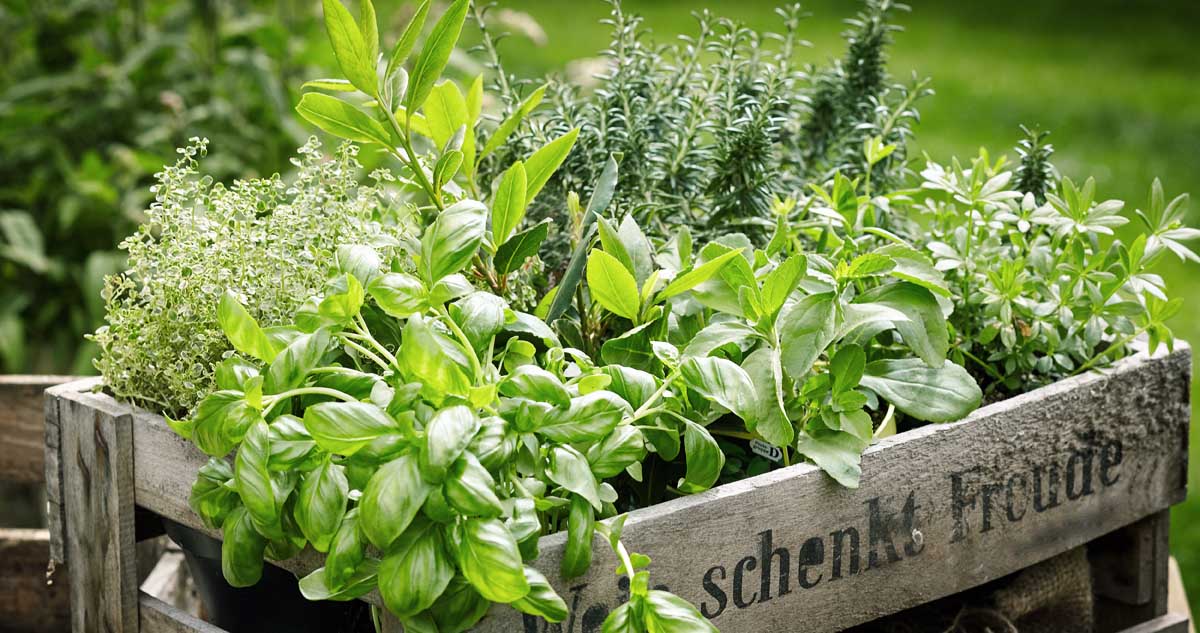
Table of Contents
Herb gardens can be a wonderful addition to your kitchen garden. Herbs give you the opportunity to enjoy the sight, fragrance, and taste of a wide range of plants. The chemical compounds in herbs are found in a variety of products that we consume daily, like antispasmodic medications, deodorants, aphrodisiacs, and even stimulants. Herbs play a major role in the production of essential oils, herbal pharmacies, and also the ayurvedic business.
Growing herbs in your garden and spending time in it is equivalent to visiting an aromatherapy clinic. Herbs not only enhance the flavour of your food and make it nutritious but also strengthen your mental health.
For individuals with little space and for those who want to grow their own herbs, here are 15 ideas.
1. Hang Your Herb Garden
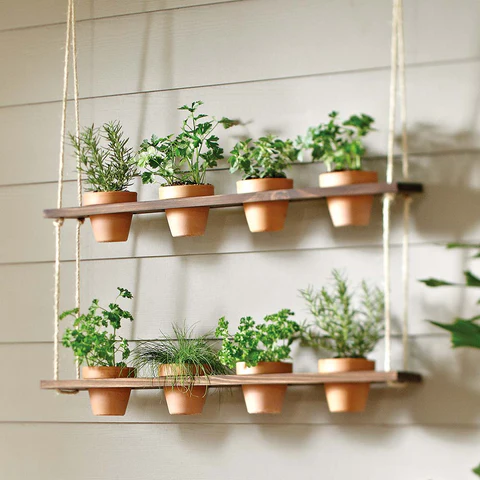
If you are living in a townhouse and have insufficient surface space or floor to create and maintain a herb garden, then a hanging herb garden is the perfect solution. You can suspend baskets on hooks that are attached to the wall. Another solution is to fix poles from one end of the yard to another and dangle baskets on a rope. This way, you can hang as many baskets as you like and create ample space for your herbs.
2. Plant Your Herbs Around a Bench
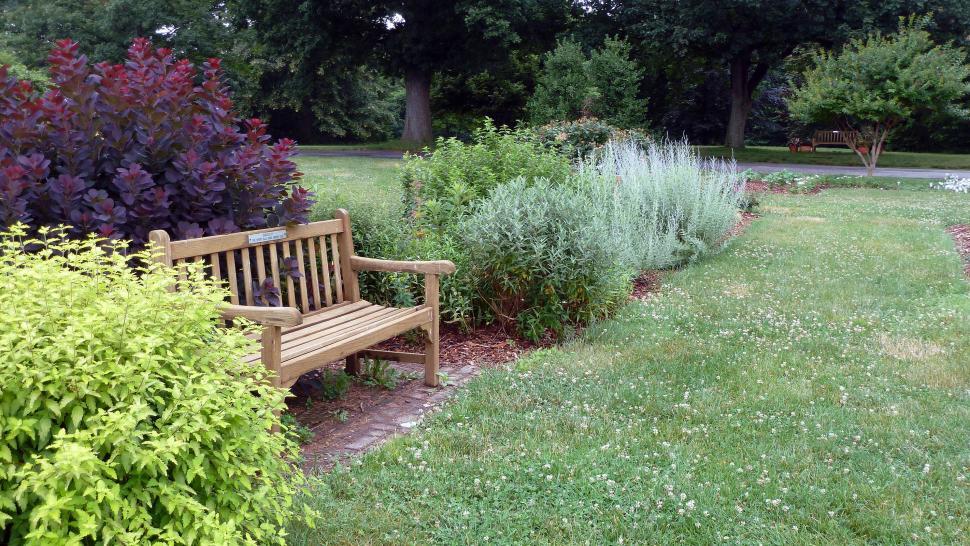
If you have a huge garden and love spending time in it, make sure that it looks and smells divine. A creative way of doing this is to place a bench in the middle of your garden and grow herbs around it. Instead of just waking by a herby patch, make it an immersive experience and surround the bench with herbs like rosemary and thyme as borders. For your cottage garden to look picture-perfect, you can grow herb bushes around a gazebo or a fountain.
3. Hedges as Herb Garden
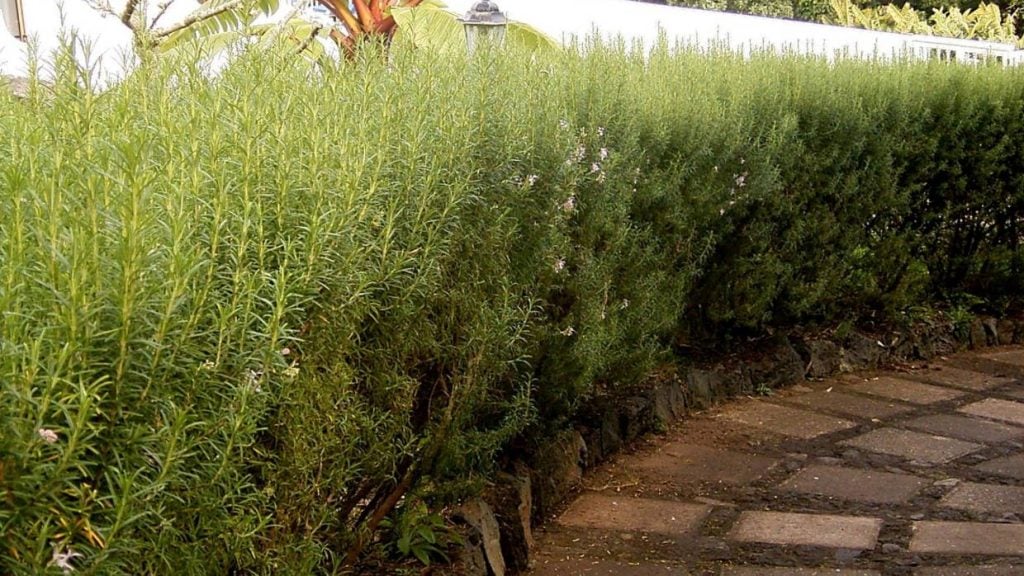
A thick rosemary plant can perform the function of an excellent border option for patios, flowerbeds, and creating barriers as it can grow 4-6 feet tall. This is an evergreen shrub that has a stimulating aroma and beautiful violet flowers that bloom during summertime. Other herbs that can be grown as hedges are Lavender, hyssop, thyme, oregano, lemon balm, basil, and chives. Shape it according to the height of the bench, patio, or flower bed to give your garden a tidy look. All these hedges can be kept compact with regular pruning and are very easy to grow when planted in close proximity.
4. Choose the Right Companion
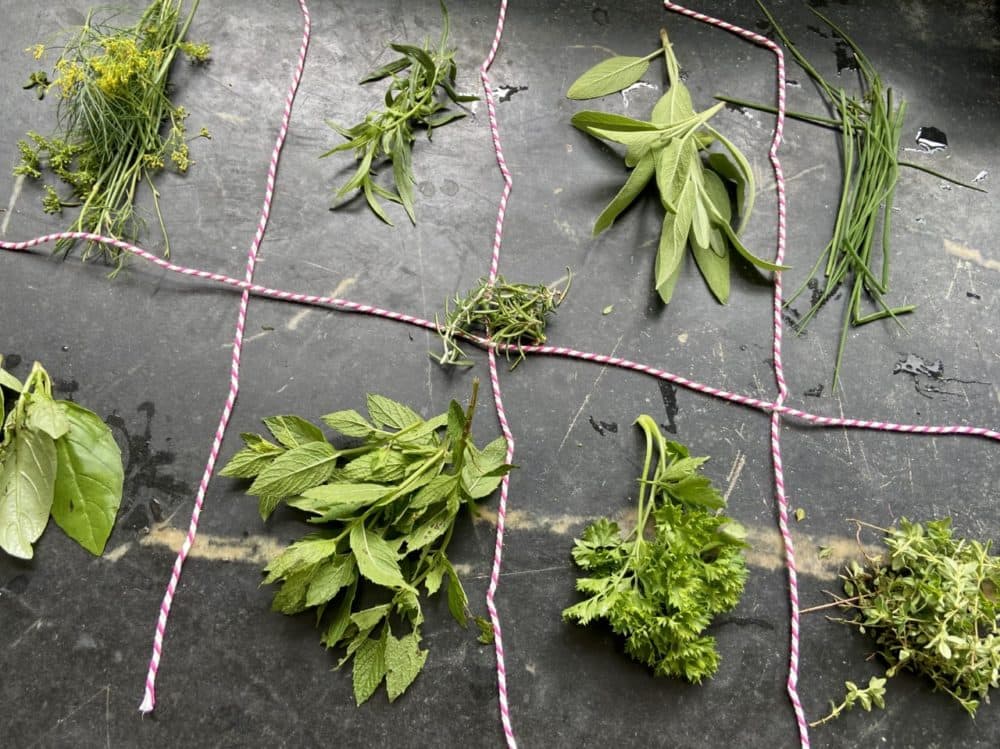
While selecting herbs and other plants, make sure that the plants can coexist with each other. At certain times, plants are more susceptible to pests and insects than the plant planted next to them. For instance, dill attracts more pests than lavender, which makes them detrimental to each other. Mint and parsley must never be grown together as the former is highly aggressive. Therefore, it is rightly said, “Grow mints with mints”. Herbs that are friendly must be grown together. Basil, parsley, cilantro, and tarragon are compatible with each as they respect their own space, the soil’s pH level stays stable because of which there is no toxicity, and the place looks nice when these plants are grown together.
5. Raised Herb Garden bed
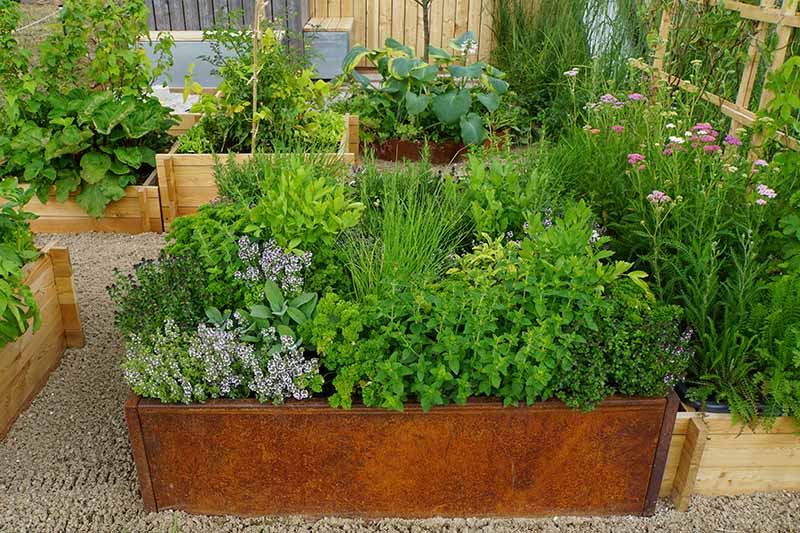
Installing kitchen gardens will allow you to include a kitchen garden in the main garden if you do not have a separate location for one but want to jump on the ‘grow your own’ bandwagon. These beds are available in multiple shapes and sizes. Since the soil type and other factors do not have to be the same as those for other plants or trees in the garden, growing herbs in raised beds give you better control over these factors. Another advantage of these beds is that your herbs will not be trampled by people and is safe for pets as they will not be able to come in contact with it. Certain herbs like lavender are toxic for cats, so this is a safe method for pets and children.
6. Herbs as Borders
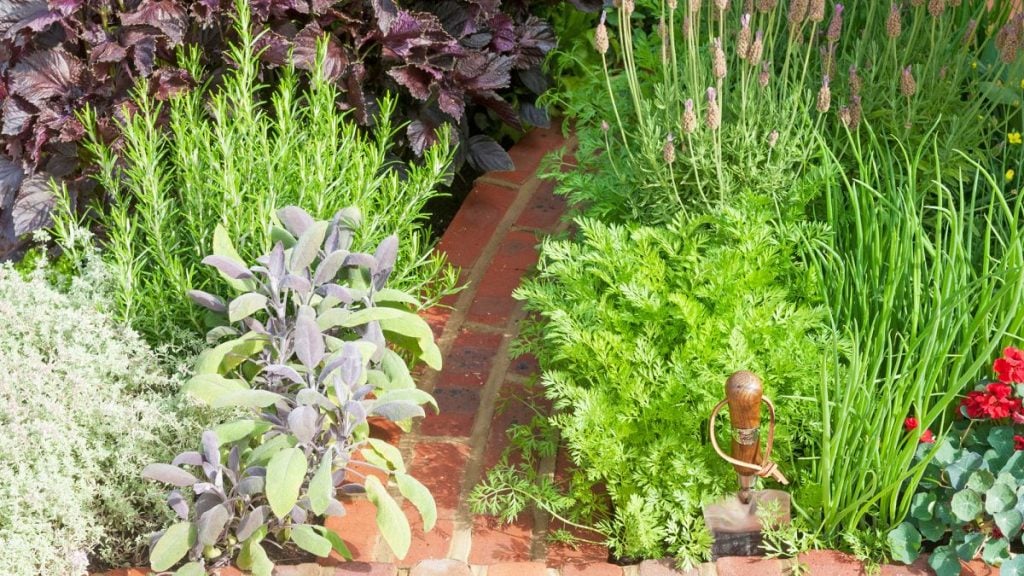
There are many herbs that can serve the purpose of borders because of their thick foliage, height, and even size. If you have pets, select thyme and chamomile as borders because they can tolerate some amount of foot traffic or paw traffic. However, a sturdy plant like lavender can be planted for edging as it can confine a riotous kitchen garden. Bordering your flower bed with herbs can add gentle formality to your lawn and also add some fragrance to your garden because of the gentle year-round foliage.
7. Herb Garden planter
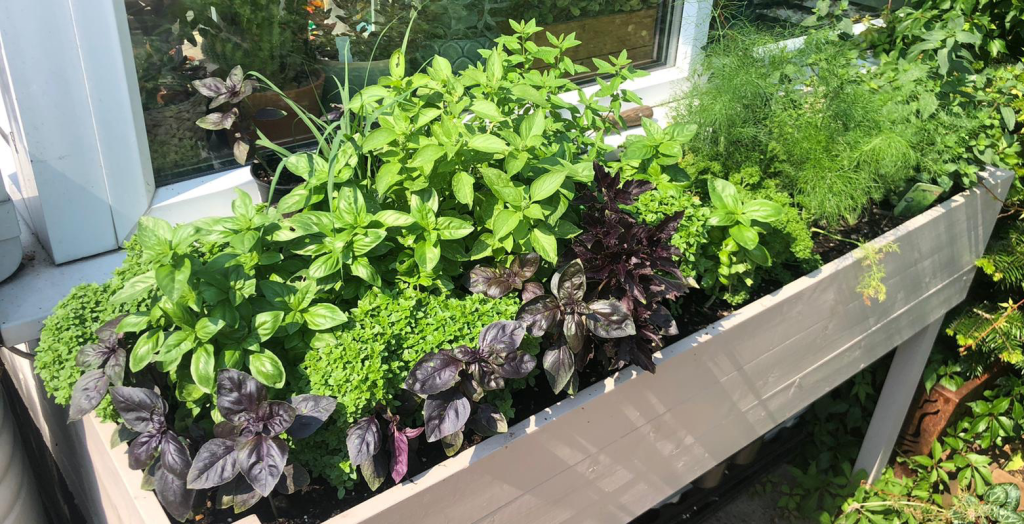
Elevated structures are best for those who do not want to sit and prune. These tables are easily available at hardware stores or garden centres and can be customised according to your requirements. You can grow multiple herbs in one garden as the table is divided into compartments which makes it easy to segregate the plants and monitor their growth. Nowadays, vertical planters are being used the most. The most common way of growing vertical gardens is to place pots on the step of recycled ladders.
8. Potted Herb Garden
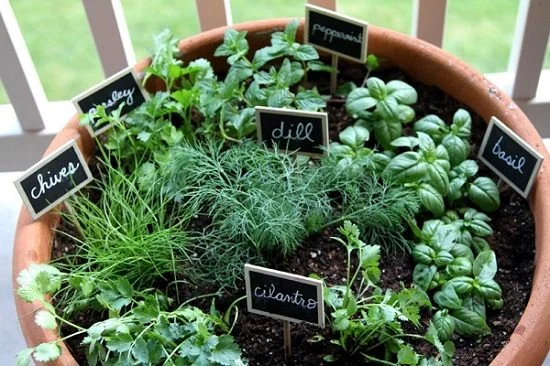
Individual terracotta pots can be used to grow herbs. There are many advantages to growing herbs this way. First of all, you can easily remember which herb has been grown in which pot. Secondly, there is no competition for nutrients as they are growing individually. Lastly, you can move these pots in shade and sunlight according to your convenience and even keep them inside during winter. Plastic pots are best for herbs that grow in plastic containers, whereas terra cotta is best for those that grow in dry soil because these pots can retain moisture for a long time and very effectively.
9. Indoor Herb Garden
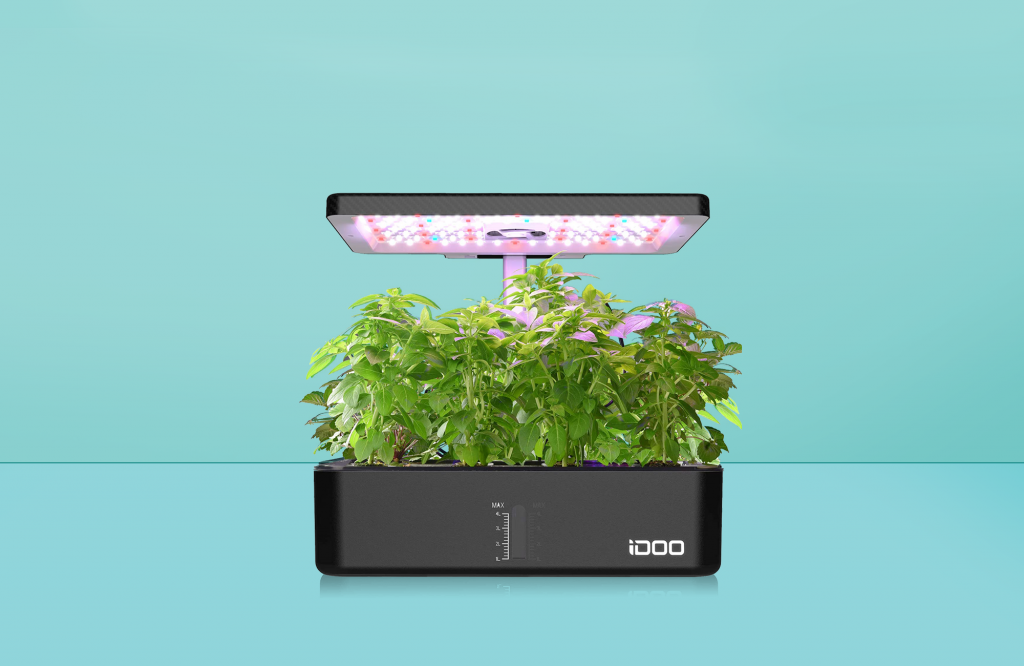
If you live in an apartment without a balcony but want to grow your organic herbs, then this is for you. Herbs need at least 6 hours of sunlight every day, so place them next to a window or under LED lights for a minimum of 14 hours. Plant your herbs in good drainage pots, and place saucers under the pots to gather excess water. Basic herbs like basil, oregano, mint, chives, etc., can thrive beautifully if planted indoors.
Many hanging planters that are suspended from the ceiling are also available and are ideal for those who do not have a big lawn or enough surface space.
10. Grow Herbs in Window Boxes
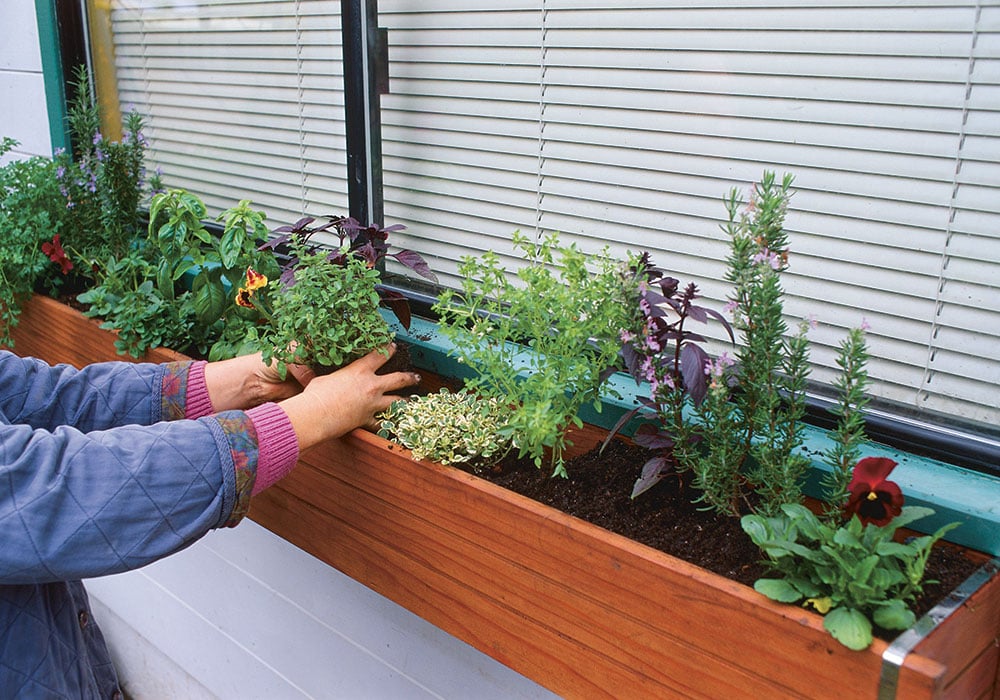
Select dwarf varieties of herbs if you want to plant them in window boxes. They are perfect for planting culinary herbs as many herbs like ‘Blue Boy’ rosemary, ‘Minette’ basil, and moss-curled parsley grow best in confined spaces. Leave some gaps behind your window box for proper circulation of air, and select sturdy, wide, and lightweight boxes for the best results. It is a very convenient method for those who do not want to sit and prune or maintain plants. Herbs require a certain amount of monitoring, so growing them in window boxes is a smart option.
11. Grow Herbs in Basket Cases
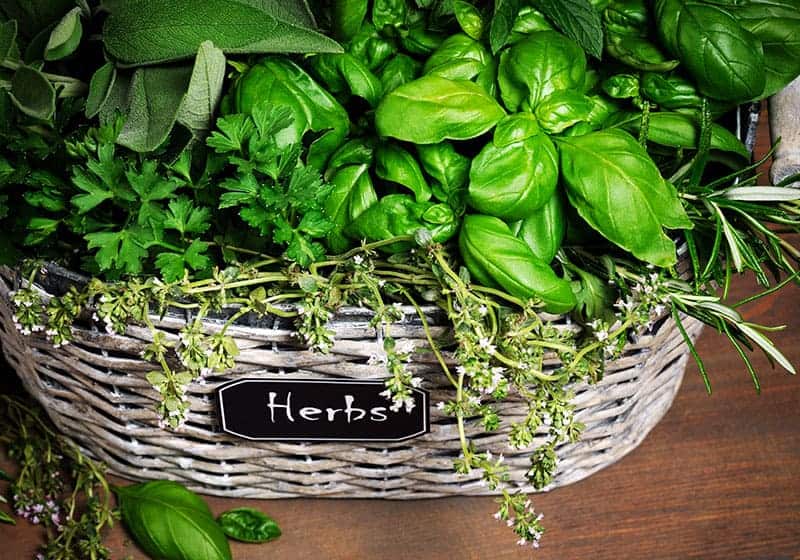
Some people prefer herb garden basketcases over pots because they are lighter. Therefore, they can be moved easily and are unconventional, which makes them attractive. Prepare your basket by lining it with moss and placing a thick plastic over the basket. Cut the plastic sheet according to the size of the basket, place a layer of gravel on the base of the basket to allow proper drainage, and fill it with potting soil. Complete the process by sowing your saplings, and enjoy!
12. Herbs as Corner Decoration
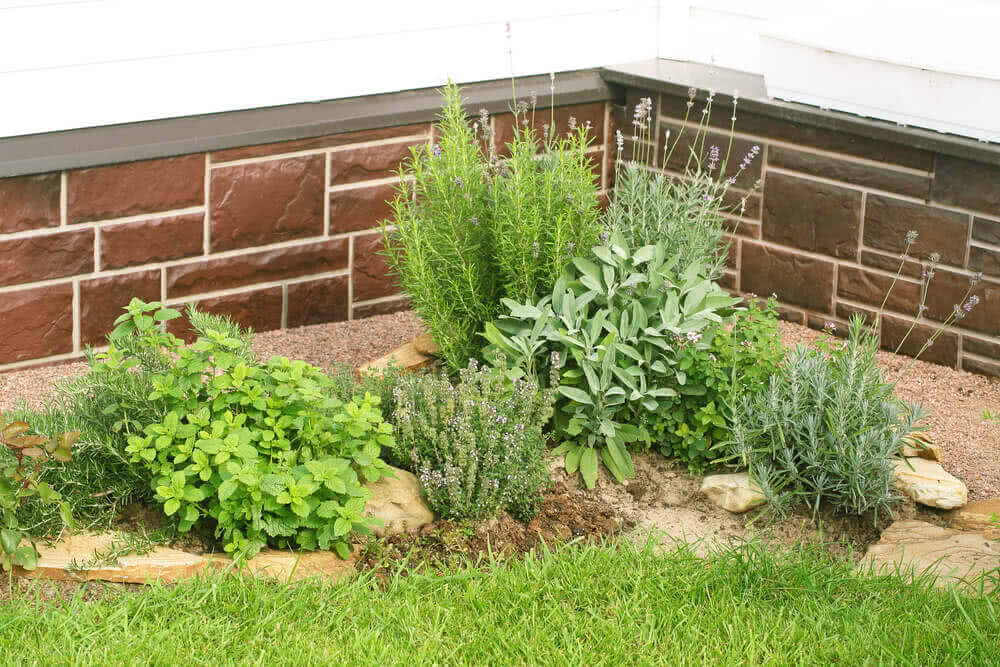
Every house or garden has a dull corner. To make good use of it and add some colour, grow your herbs there. This way, you will be utilising all that extra space productively, have a separate kitchen nook, and it is a safer option for your herbs as they will not be attacked by those pests that are attracted to flowers and other plants in the garden. Also, foot traffic in such corners is minimal, so your herbs will be saved from getting trampled.
13. Rooftop Herb Garden
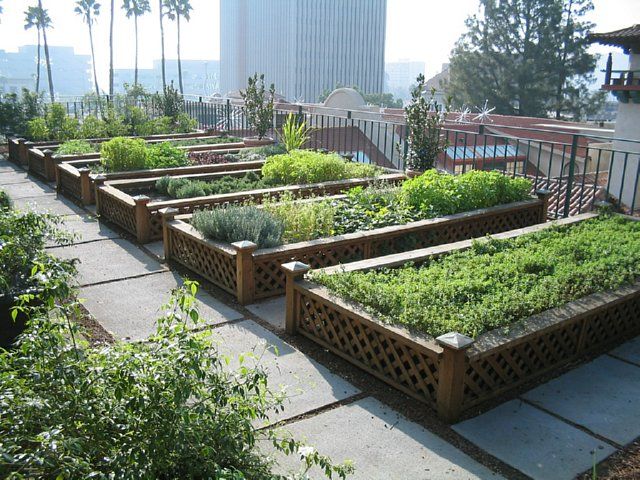
For those who are living in an apartment building, herbs can be grown on rooftops. This way, your herbs will get an ample amount of sunlight. However, remember to grow them in lightweight pots so that they can be moved indoors when the weather gets rough, as you might have to carry them up and down the stairs. Nevertheless, having access to organic home-grown herbs in an urban landscape is worth the effort.
14. Balcony Herb Garden
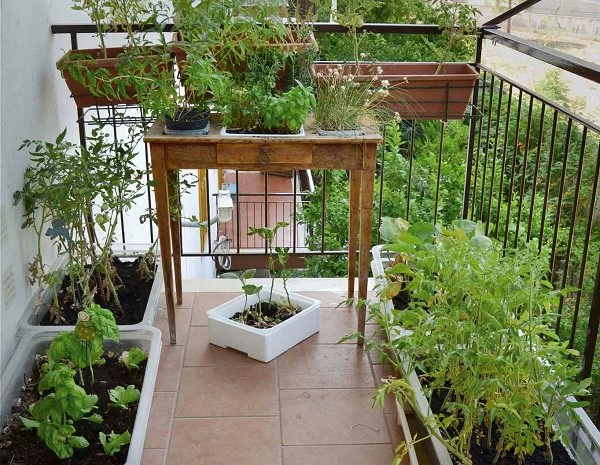
If you have an apartment with a personal balcony where you wish to grow herbs, then the sky’s the limit for you. You can hang baskets, dangle baskets on a rope, grow herbs in rectangular planters, and plant herbs in pots and baskets that can easily be carried upstairs. This way can allow you to have a full-fledged herb garden for you. Irrespective of whether you are growing herbs for medicinal purposes or culinary, having a herb garden on your balcony can help you in connecting with nature in an urban environment which is vital for one’s mental well-being. Balcony space can be used very smartly by attaching a frame to a wall and hanging pots from it, as shown below. This will also save some space for you on the balcony to move around.
15. Hydroponic Herb Garden
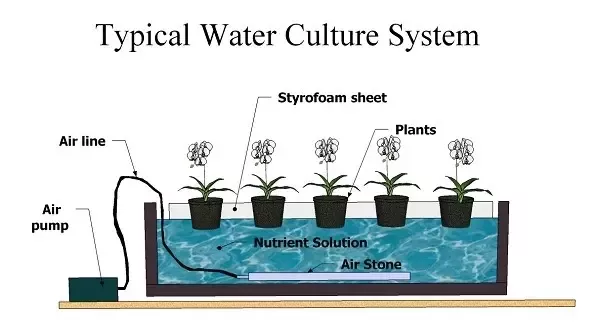
Are you working in the IT sector, and the corporate job leaves you no time to spare for your hobbies? Try hydroponic gardening. Your plants will have an extended growing season, you will face lesser pest problems, your plants will mature faster, and most importantly, there will be no soil and organic matter to deal with. This way, there will be less mess in your apartment and no unpleasant odour of manure.
Conclusion
Herbs lend a dish a very delicate flavour but a very powerful scent. Herbs are versatile because they can be crushed, boiled, eaten raw, and even cooked.
Growing herbs in your own house can be very beneficial for your health as they will be completely devoid of synthetic fertilisers and insecticides and also grow in a clean space in limited quantity. Herbs can be grown anywhere very conveniently, and you must include them in your diet.
More than physical health, herbs are extremely beneficial for mental health as consumption of these herbs promotes mental and emotional clarity.
If you are living in a small space but have managed to make your herb garden, do let us know how and share the details with us in the comment section.
Frequently Asked Questions
Are Herbs Supposed to Be Watered Every Day?
Generally, herbs need watering two to three times a week. However, in the beginning, water the saplings more frequently to keep the soil moist and soft. Cilantro, basil, mint, and parsley need consistent irrigation throughout.
However, avoid overwatering the plants because that can cause the roots to rot.
What Are the Advantages of Growing Herbs on Your Own?
The advantages of growing one’s own herbs are that fresh herbs make food taste better, save you a lot of money, it is a sustainable habit which is important for the planet, and are organic because no synthetic insecticides or pesticides are sprayed on them.
How Can a Herb Garden Prevent Pests or Animals from Entering a Garden?
Herbs smell divine to us but have a repulsive smell for certain animals. Therefore, cats, dogs, deer, and certain other animals are not naturally attracted to them. Herbs can also be grown as a deterrent along the boundary wall of your house.

